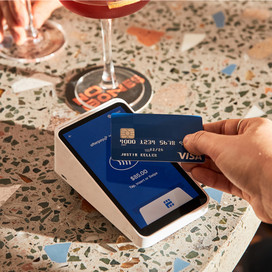Table of contents
Square Dashboard is a powerful tool to help you manage and track sales so that you can run your business more easily. Learn more about Square Dashboard.
Disagreements with customers are no fun. This is especially true when it comes to payment disputes, also known as chargebacks. Below, we’ll walk through the basics of the dispute process, what usually causes them, and the steps you can take to prevent disputes from happening
What Is a Chargeback (or Payment Dispute)?
A payment dispute, also referred to as a chargeback, occurs when a cardholder questions a transaction and asks their card-issuing bank to reverse it. The ability to dispute a payment is meant to protect consumers from unauthorised transactions and problems with goods or services, but it can mean big headaches for businesses, especially when they’re issued in error.
When a payment dispute occurs, we place a hold on the disputed funds in your Square account until the dispute gets cleared up. This is because the customer’s bank has just taken the funds from us, and we need to cover that amount. If there aren’t enough funds available in your Square account, we’ll have to debit your linked bank account to cover the disputed amount. If the bank rules against you, those funds are returned to the cardholder. If the bank rules in your favour, the funds will be returned to you.
Square doesn’t decide who wins or loses a dispute—that’s up to the bank that issued your customer’s credit card. Unfortunately, this can be a complicated and time-consuming process involving a lot of paperwork and documentation. If you sell with Square, you can rest a little easier about chargebacks as we’re here to help you every step of the way. Learn more about resolving payment disputes with Square.
Common Causes of Payment Disputes and How to Prevent Them
There are a few typical culprits behind payment disputes. Fortunately, there are systems and processes you can put in place to prevent them.
Fraudulent transactions
If a cardholder sees a charge from your business but never bought anything from you, it could mean fraud is at play. This usually prompts them to file a dispute.
How to prevent this type of dispute:
- Use one of our secure readers to accept chip and contactless payments (including Apple Pay and Google Pay).
- Train employees on best practices for accepting card payments.
- Use Square to email or text receipts to cardholders.
Shipping, delivery, or pricing issues
If a cardholder never receives an ordered item or is overcharged for a product/service, they may file a dispute.
How to prevent this type of dispute:
- Keep tracking numbers for every order ready and accessible.
- Verify your customers shipping address and seek additional verification for international orders.
- Use a delivery service that requires a signature when the item arrives with your customer.
- Make sure your listed prices are accurate and up to date and be sure to communicate any additional costs to your customer before charging them.
Credit not processed
In these cases, a cardholder returns an item in expectation of a refund or account credit and receives neither. The reason for that return may vary — maybe it’s buyer’s remorse or the user’s error when purchasing online.
How to prevent this type of dispute:
- Make sure you have a reliable system in place for handling returns and credits.
- Clearly outline sales policies like your return, refund, or cancellation terms on your receipts and post them clearly in your store (whether that’s a brick-and-mortar location or an online store). This makes you more likely to win payment disputes should they arise. You can add policies to your Square receipt.
Dissatisfaction with product or service
Cardholders sometimes file a dispute if they are dissatisfied with your product or service. In the case of products, this is typically due to physical defects or an item not being as advertised. With services, the quality is more subjective and difficult to determine.
How to prevent this type of dispute:
- Respond to customer service issues promptly and courteously.
- Set realistic expectations and ensure you have signed documents from your customer showing that they agree with your terms and conditions including your refund policy.
Unrecognisable business name
Legitimate purchases can be mistaken as fraudulent due to simple confusion. Let’s say your business sells coffee and bagels. Your shop is called “Bagel Café”, but the business name on your receipts is “Smith Enterprises”. If cardholders see charges from Smith Enterprises, a company they’ve never heard of, they may suspect fraud and, in turn, file a dispute.
How to prevent this type of dispute:
- Avoid confusion by having clear, consistent branding on your receipts. You can change your receipt name via your Square Dashboard.
Failure to cancel subscription
Recurring payments for subscriptions are beneficial for both businesses and cardholders, but they can also create a risk for disputes. Cardholders often forget about subscription renewals and will issue disputes to retroactively cancel payment.
How to prevent this type of dispute:
- If you plan to initiate a series of recurring payments, ensure that cardholders understand the recurring transaction agreement (RTA) that they are signing up for. If possible, provide a way for them to acknowledge their understanding and agreement with something visual like a checkbox or signature.
- Explain the billing frequency, amount, refund, and cancellation policies in the RTA.
- Alert cardholders prior to each charge, giving them ample time to cancel before the transaction is made.
How Square Handles Payment Disputes
At Square we do things a little differently than other processors. We have a team on hand to make the disputes process as simple as possible for you.
Square doesn’t decide who wins or loses a dispute—that’s up to the bank that issued your customer’s credit card. Unfortunately, this can be a complicated and time-consuming process involving a lot of paperwork and documentation. If you sell with Square, you can rest a little easier about chargebacks as we’re here to help you every step of the way. Learn more about resolving payment disputes with Square.
- Step 1: We notify you of the dispute. We will place a hold for the total dispute amount on your Square account, if this amount is not available in your account balance we will debit your bank account.
- Step 2: You decide on how you’d like to proceed. You can either accept the dispute as valid or choose to challenge it by sending us the documentation you have related to the transaction.
- Step 3: The bank determines whether the purchase was legitimate or not. If the bank rules in your favor, the transaction stands. If the bank rules in the customer’s favor, the funds are returned to the cardholder.
FAQ:
What’s the difference between a dispute and a refund?
A refund is a transaction that you initiate as a Square seller to repay a cardholder who’s dissatisfied with the goods or services purchased. A dispute is a forced refund initiated by a cardholder and issued through their bank.
How will I know if a cardholder has filed a dispute?
You will be alerted of any payment disputes with a notification in your Square Dashboard and via email.
What is a dispute fee or dispute settlement fee?
A dispute fee, or dispute settlement fee, is a fee your credit card processing company may charge you, in addition to the reversed funds, if it finds you at fault for a chargeback. Square never charges you an additional fee for a dispute. We only take the amount of the transaction that was originally charged, this can include international transaction fees if the dispute comes from a foreign bank. Many payment processing companies may disallow you from accepting credit cards entirely if you have an unusual amount of chargebacks on your account.
Why is my chargeback amount different from the transaction amount?
If a cardholder is claiming that they were overcharged, then the dispute may only be for this amount. For example, a cardholder who was charged $100 but claims to have only agreed to pay $50, might issue a dispute for $50. International cards can result in dispute amounts which are higher than the original transaction. This is because when you take a payment from an international customer we charge their card in AUD, their bank is responsible for converting this to the cardholder’s local currency. This will be based on the current FX rate and may include a small processing fee for the cardholder. If a dispute is issued for these transactions it will be based on the current FX rate and may also include the processing fee originally charged to the cardholder.
Does Square have dispute fees?
No, Square doesn’t charge any additional fees for disputes. Most other payment processors charge a nonrefundable fee ranging from $25 to $50. Square covers the fees associated with payment disputes on your behalf. Square will only seek to recover the original transaction amount, including the processing fee.
Is there a time limit on payment disputes?
Time limits vary depending on the credit card company and the reason for the dispute. Check with the card issuing banks to determine what time limits may apply to your specific case.
Are debit card disputes handled the same way?
Different card brands (Visa, Mastercard, and eftpos) have varying policies when it comes to debit transactions. Generally, if a debit card transaction was approved with a PIN, cardholders have a smaller window in which fraud protection is available.
How do I write a chargeback rebuttal letter?
The good news is that if you sell with Square, you never need to worry about writing a chargeback rebuttal letter. All we ask of our sellers is that they address their customer’s claim promptly in the Information Request Form that we email for every dispute. We then use that information to challenge your customer’s dispute with their bank. We’re your advocate.
![]()











